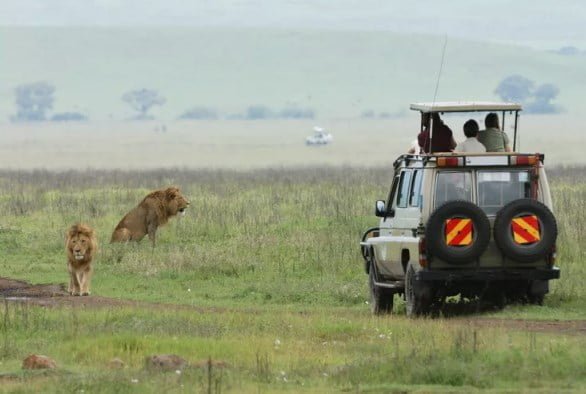Ecotourism is about more than simply visiting natural attractions or natural places; it’s about doing so in a responsible and sustainable manner. The term itself refers to traveling to natural areas with a focus on environmental conservation. The goal is to educate tourists about conservation efforts while offering them the chance to explore nature.
Ecotourism has benefited destinations like Madagascar, Ecuador, Kenya, and Costa Rica, and has helped provide economic growth in some of the world’s most impoverished communities.

Ecotourism Definition and Principles
A conservationist by the name of Hector Ceballos-Lascurain is often credited with the first definition of ecotourism in 1987, that is, “tourism that consists in travelling to relatively undisturbed or uncontaminated natural areas with the specific object of studying, admiring and enjoying the scenery and its wild plants and animals, as well as any existing cultural manifestations (both past and present) found in these areas.”
The International Ecotourism Society (TIES), a non-profit organization dedicated to the development of ecotourism since 1990, defines ecotourism as “responsible travel to natural areas that conserves the environment, sustains the well-being of the local people, and involves interpretation and education [both in its staff and its guests].”
The International Union for Conservation of Nature (IUCN) looks at ecotourism as a significant tool for conservation, though it shouldn’t be seen as a fix-all when it comes to conservation challenges:
“There may be some areas that are just not appropriate for ecotourism development and some businesses that just won’t work in the larger tourism market. That is why it is so important to understand the basics of developing and running a successful business, to ensure that your business idea is viable and will be profitable, allowing it to most effectively benefit the surrounding environment and communities.”
Marketing an ecosystem, species, or landscape towards ecotourists helps create value, and that value can help raise funds to protect and conserve those natural resources.
Sustainable ecotourism should be guided by three core principles: conservation, communities, and education.
Conservation
Conservation is arguably the most important component of ecotourism because it should offer long-term, sustainable solutions to enhancing and protecting biodiversity and nature. This is typically achieved through economic incentives paid by tourists seeking a nature-based experience, but can also come from the tourism organizations themselves, research, or direct environmental conservation efforts.
Communities
Ecotourism should increase employment opportunities and empower local communities, helping in the fight against global social issues like poverty and achieving sustainable development.

Interpretation
One of the most overlooked aspects of ecotourism is the education component. Yes, we all want to see these beautiful, natural places, but it also pays to learn about them. Increasing awareness about environmental issues and promoting a greater understanding and appreciation for nature is arguably just as important as conservation.
Pros and Cons
As one of the fastest growing sectors of the tourism industry, there are bound to be some downsides to ecotourism. Whenever humans interact with animals or even with the environment, it risks the chance of human-wildlife conflict or other negative effects; if done so with respect and responsibility in mind, however, ecotourism can reap enormous benefits to protected areas.
As an industry that relies heavily on the presentation of eco-friendly components to attract customers, ecotourism has the inevitable potential as a vessel for greenwashing. Part of planning a trip rooted in ecotourism is doing research to ensure that an organization is truly providing substantial benefits to the environment rather than exploiting it.
Ecotourism Can Provide Sustainable Income for Local Communities
Sustainably managed ecotourism can support poverty alleviation by providing employment for local communities, which can offer them alternative means of livelihood outside of unsustainable ones (such as poaching).
It Protects Natural Ecosystems
Ecotourism offers unique travel experiences focusing on nature and education, with an emphasis on sustainability and highlighting threatened or endangered species. It combines conservation with local communities and sustainable travel, highlighting principles (and operations) that minimize negative impacts and expose visitors to unique ecosystems and natural areas. When managed correctly, ecotourism can benefit both the traveler and the environment, since the money that goes into ecotourism often goes directly towards protecting the natural areas they visit.
Each year, researchers release findings on how tourist presence affects wildlife, sometimes with varying results. A study measuring levels of the stress hormone cortisol in wild habituated Malaysian orangutans found that the animals were not chronically stressed by the presence of ecotourists.
Ecotourism May Also Hurt Those Same Natural Ecosystems
Somewhat ironically, sometimes ecotourism can hurt ecosystems just as much as it can help. Another study in the journal Trends in Ecology and Evolution found that ecotourism can alter animal behaviors in ways that put them at risk. If the presence of humans changes the way animals behave, those changes may make them more vulnerable by influencing their reaction to predators or poachers.
It’s not just the animals who are at risk. As ecotourism activities become too popular, it can lead to the construction of new infrastructure to accommodate more visitors. Similarly, more crowds mean more pressure on local resources, increased pollution, and a higher chance of damaging the soil and plant quality through erosion. On the social side, these activities may displace Indigenous groups or local communities from their native lands, preventing them from benefiting from the economic opportunities of tourism.
Ecotourism also educates children about nature, potentially creating new generations of nature lovers that could someday become conservationists themselves. Even adult visitors may learn new ways to improve their ecological footprints.
